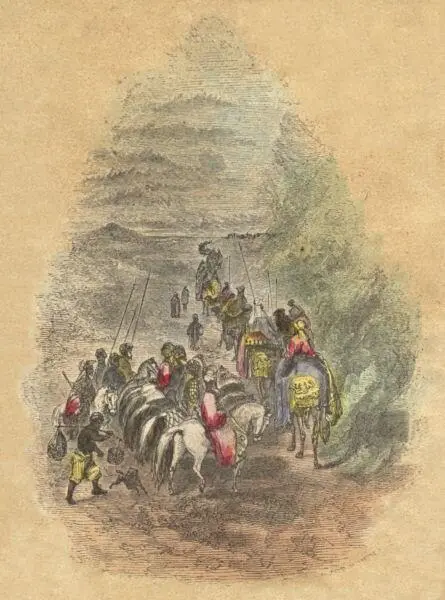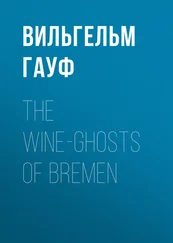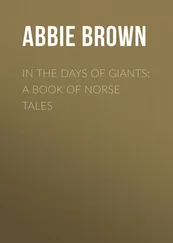Вильгельм Гауф - The Oriental Story Book - A Collection of Tales
Здесь есть возможность читать онлайн «Вильгельм Гауф - The Oriental Story Book - A Collection of Tales» — ознакомительный отрывок электронной книги совершенно бесплатно, а после прочтения отрывка купить полную версию. В некоторых случаях можно слушать аудио, скачать через торрент в формате fb2 и присутствует краткое содержание. Жанр: Сказка, foreign_antique, foreign_prose, foreign_children, на английском языке. Описание произведения, (предисловие) а так же отзывы посетителей доступны на портале библиотеки ЛибКат.
- Название:The Oriental Story Book: A Collection of Tales
- Автор:
- Жанр:
- Год:неизвестен
- ISBN:нет данных
- Рейтинг книги:4 / 5. Голосов: 1
-
Избранное:Добавить в избранное
- Отзывы:
-
Ваша оценка:
- 80
- 1
- 2
- 3
- 4
- 5
The Oriental Story Book: A Collection of Tales: краткое содержание, описание и аннотация
Предлагаем к чтению аннотацию, описание, краткое содержание или предисловие (зависит от того, что написал сам автор книги «The Oriental Story Book: A Collection of Tales»). Если вы не нашли необходимую информацию о книге — напишите в комментариях, мы постараемся отыскать её.
The Oriental Story Book: A Collection of Tales — читать онлайн ознакомительный отрывок
Ниже представлен текст книги, разбитый по страницам. Система сохранения места последней прочитанной страницы, позволяет с удобством читать онлайн бесплатно книгу «The Oriental Story Book: A Collection of Tales», без необходимости каждый раз заново искать на чём Вы остановились. Поставьте закладку, и сможете в любой момент перейти на страницу, на которой закончили чтение.
Интервал:
Закладка:
Wilhelm Hauff
The Oriental Story Book: A Collection of Tales

INTRODUCTION
IN a beautiful distant kingdom, of which there is a saying, that the sun on its everlasting green gardens never goes down, ruled, from the beginning of time even to the present day, Queen Phantasie. With full hands, she used to distribute for many hundred years, the abundance of her blessings among her subjects, and was beloved and respected by all who knew her. The heart of the Queen, however, was too great to allow her to stop at her own land with her charities; she herself, in the royal attire of her everlasting youth and beauty, descended upon the earth; for she had heard that there men lived, who passed their lives in sorrowful seriousness, in the midst of care and toil. Unto these she had sent the finest gifts out of her kingdom, and ever since the beauteous Queen came through the fields of earth, men were merry at their labor, and happy in their seriousness.
Her children, moreover, not less fair and lovely than their royal mother, she had sent forth to bring happiness to men. One day Märchen 1 1 Märchen represents the fairy or legendary tales, of which the Germans were at one time so fond.
, the eldest daughter of the Queen, came back in haste from the earth. The mother observed that Märchen was sorrowful; yes, at times it would seem to her as if her eyes would be consumed by weeping.
“What is the matter with thee, beloved Märchen?” said the Queen to her. “Ever since thy journey, thou art so sorrowful and dejected; wilt thou not confide to thy mother what ails thee?”
“Ah! dear mother,” answered Märchen, “I would have kept silence, had I not known that my sorrow is thine also.”
“Speak, my daughter!” entreated the fair Queen. “Grief is a stone, which presses down him who bears it alone, but two draw it lightly out of the way.”
“Thou wishest it,” rejoined Märchen, “so listen. Thou knowest how gladly I associate with men, how cheerfully I sit down before the huts of the poor, to while away a little hour for them after their labor; formerly, when I came, they used to ask me kindly for my hand to salute, and looked upon me afterwards, when I went away, smiling and contented; but in these days, it is so no longer!”
“Poor Märchen!” said the Queen as she caressed her cheek, which was wet with a tear. “But, perhaps, thou only fanciest all this.”
“Believe me, I feel it but too well,” rejoined Märchen; “they love me no more. Wherever I go, cold looks meet me; nowhere am I any more gladly seen; even the children, who ever loved me so well, laugh at me, and slyly turn their backs upon me.”
The Queen leaned her forehead on her hand, and was silent in reflection. “And how, then, Märchen,” she asked, “should it happen that the people there below have become so changed?”
“See, O Queen Phantasie! men have stationed vigilant watchmen, who inspect and examine all that comes from thy kingdom, with sharp eyes. If one should arrive who is not according to their mind, they raise a loud cry, and put him to death, or else so slander him to men, who believe their every word, that one finds no longer any love, any little ray of confidence. Ah! how fortunate are my brothers, the Dreams! they leap merrily and lightly down upon the earth, care nothing for those artful men, seek the slumbering, and weave and paint for them, what makes happy the heart, and brightens the eye with joy.”
“Thy brothers are light-footed,” said the Queen, “and thou, my darling, hast no reason for envying them. Besides, I know these border-watchmen well; men are not so wrong in sending them out; there came so many boastful fellows, who acted as if they had come straight from my kingdom, and yet they had, at best, only looked down upon us from some mountain.”
“But why did they make me, thine own daughter, suffer for this?” wept forth Märchen. “Ah, if thou knewest how they have acted towards me! They called me an old maid, and threatened the next time not to admit me!”
“How, my daughter?—not to admit thee more?” asked the Queen, as anger heightened the color on her cheeks. “But already I see whence this comes; that wicked cousin has slandered us!”
“Fashion? Impossible!” exclaimed Märchen; “she always used to act so friendly towards us.”
“Oh, I know her, the false one!” answered the Queen. “But try it again in spite of her, my daughter: whoever wishes to do good, must not rest.”
“Ah, mother! suppose, then, they send me back again, or slander me so that men let me stay in a corner, disregarded, or alone and slighted!”
“If the old, deluded by Fashion, value thee at nothing, then turn thee to the young; truly they are my little favorites. I send to them my loveliest pictures through thy brothers, the Dreams; yes, already I have often hovered over them in person, caressed and kissed them, and played fine games with them. They, also, know me well, though not by name; for I have often observed how in the night they laugh at my stars, and in the morning, when my shining fleeces play over the heavens, how they clap their hands for joy. Moreover, when they grow larger, they love me still; then I help the charming maids to weave variegated garlands, and the wild boys to become still, while I seat myself near them, on the lofty summit of a cliff, steep lofty cities and brilliant palaces in the mist-world of the blue mountains in the distance, and, on the red-tinged clouds of evening, paint brave troops of horsemen, and strange pilgrim processions.”
“Oh, the dear children!” exclaimed Märchen, deeply affected. “Yes—be it so! with them I will make one more trial.”
“Yes, my good child,” answered the Queen; “go unto them; but I will attire thee in fine style, that thou mayest please the little ones, and that the old may not drive thee away. See! the dress of an Almanach 2 2 The German “Almanach” corresponds in a measure with the English “Annual.”
will I give thee.”
“An Almanach, mother? Ah!—I will be ashamed to parade, in such a way, before the people.”
The Queen gave the signal, and the attendants brought in the rich dress of an Almanach. It was inwrought with brilliant colors, and beautiful figures. The waiting-maids plaited the long hair of the fair girl, bound golden sandals on her feet, and arrayed her in the robe.
The modest Märchen dared not look up; her mother, however, beheld her with satisfaction, and clasped her in her arms. “Go forth!” said she unto the little one; “my blessing be with thee. If they despise and scorn thee, turn quickly unto me; perhaps later generations, more true to nature, may again incline to thee their hearts.”
Thus spoke Queen Phantasie, while Märchen went down upon the earth. With beating heart she approached the city, in which the cunning watchmen dwelt: she dropped her head towards the earth, wrapped her fine robe closely around her, and with trembling step drew near unto the gate.
“Hold!” exclaimed a deep, rough voice. “Look out, there! Here comes a new Almanach!”
Märchen trembled as she heard this; many old men, with gloomy countenances, rushed forth; they had sharp quills in their fists, and held them towards Märchen. One of the multitude strode up to her, and seized her with rough hand by the chin. “Just lift up your head, Mr. Almanach,” he cried, “that one may see in your eyes whether you be right or not.”
Blushing, Märchen lifted her little head quite up, and raised her dark eye.
“Märchen!” exclaimed the watchmen, laughing boisterously. “Märchen! That we should have had any doubt as to who was here! How come you, now, by this dress?”
Читать дальшеИнтервал:
Закладка:
Похожие книги на «The Oriental Story Book: A Collection of Tales»
Представляем Вашему вниманию похожие книги на «The Oriental Story Book: A Collection of Tales» списком для выбора. Мы отобрали схожую по названию и смыслу литературу в надежде предоставить читателям больше вариантов отыскать новые, интересные, ещё непрочитанные произведения.
Обсуждение, отзывы о книге «The Oriental Story Book: A Collection of Tales» и просто собственные мнения читателей. Оставьте ваши комментарии, напишите, что Вы думаете о произведении, его смысле или главных героях. Укажите что конкретно понравилось, а что нет, и почему Вы так считаете.












